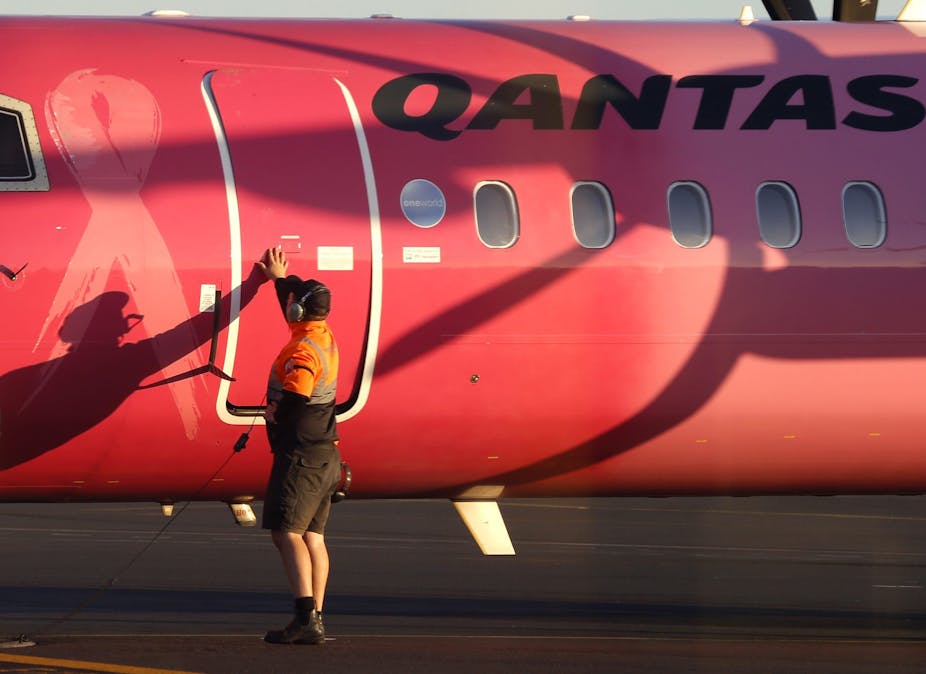The federal government will introduce legislation this week to allow majority foreign ownership of Qantas.
After a two hour cabinet debate, prime minister Tony Abbott announced tonight the government would seek to repeal part 3 of the Qantas Sale Act, which would mean that further overseas investment in the airline would come only under normal Foreign Investment Review Board scrutiny.
Existing limits on the levels of investment by overseas airlines and individual foreign entities would go, and there would not be restrictions on Qantas outsourcing jobs overseas.
But Qantas would have to separate out its overseas operation and keep that majority Australian-owned to get the advantages under the international agreements Australia holds governing landing rights in other countries. Both the headquarters and the substance of this business would have to remain in Australia.
Qantas had pushed for a debt guarantee from the government, but Abbott said: “We do not believe in government by chequebook and we certainly do not believe in any normal circumstances that government should be playing favourites between competing private businesses.”
He said the airline would be best placed if it was “unpropped up by government”.
On present indication by Labor and other players there is not support in the current or post July 1 Senate for allowing majority foreign ownership, although Labor has indicated it would be willing to consider changes to the 35% limit for foreign airlines and the 25% limit for individual foreign entities.
But Abbott expressed some confidence that Labor would buckle rather than let Qantas “bleed”.
Last month treasurer Joe Hockey gave the impression that Qantas would be treated as a special case, raising expectations of a debt guarantee or loan facility. But Abbott ruled this out late last week. The prime minister said that all points of view were canvassed at cabinet, with everyone speaking. The debt guarantee was “on the table” but not supported.
Abbott said he was confident the decision was “ultimately best for Qantas”.
He also rejected the argument that Qantas would not be an Australian company if it were majority foreign owned.
Virgin, which is foreign owned, employed Australians and served Australians, he said.
“It’s hard really to say that Virgin is substantially less Australian than Qantas itself,” he said. Both these “fine airlines” should operate under the same rules.
Earlier Qantas put out a blunt rejection of the government claim that the carbon tax was a key problem, saying the major issues it faced “are not related to carbon pricing”. In Parliament Abbott had dwelt to the shackle of the carbon tax on Qantas and other airlines. Virgin has highlighted the carbon tax.
“ISSUE: Claims that the carbon tax is a key issue facing Qantas
"FACTS: The major issues fac[ing] Qantas are not related to carbon pricing.”
Labor reaffirmed its opposition to allowing majority foreign ownership.
Aviation spokesman Anthony Albanese said the decision had gone far beyond what anyone expected. The government was trying to get rid of “everything that makes the flying kangaroo a kangaroo.”
Opposition leader Bill Shorten said it was remarkable that there was a government in Australia that would “create a new export industry – exporting Australian jobs..” He said he had no doubt the Qantas management felt betrayed because of what they had previously been led to believe about the prospect of a debt guarantee.
Shadow treasurer Chris Bowen said the government was just trying to play politics rather than get measures through parliament.
Qantas said in a statement Monday night that removing the foreign ownership provisions was an important longer term objective but it was clear the move would have “limited chance” of passing the Senate.
Qantas needed “immediate action” to address the imbalance created by Virgin’s “unlimited ability to access foreign capital from government-owned airlines to fund a loss-making strategy against Qantas”. If the change was not passed Qantas would expect the government and parliament “to consider alternative measures to balance the unlevel playing field”.

